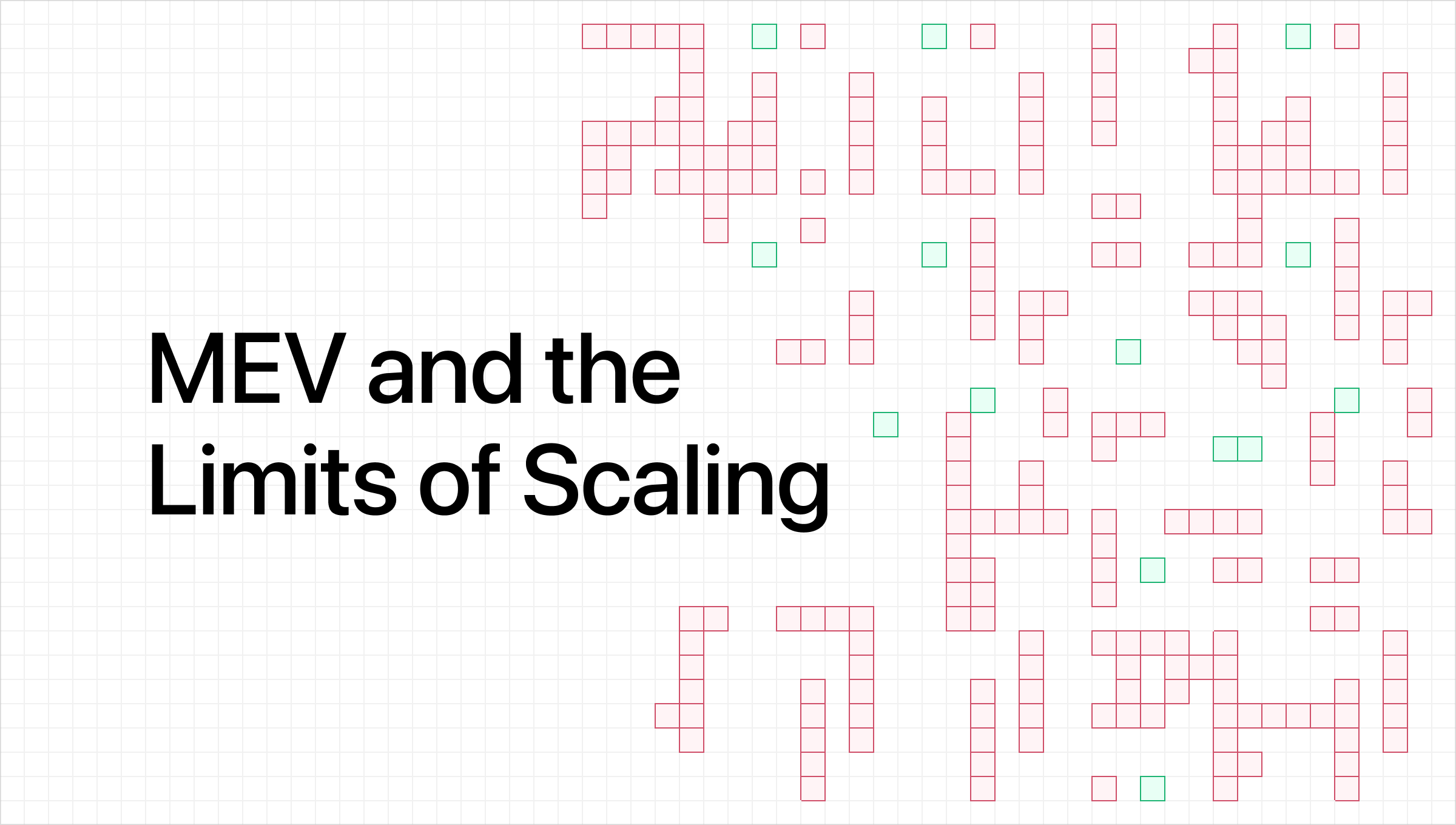
Sequencing has become the frontier in blockchain innovation. We are partnering with Optimism to make the best sequencer in crypto.
A collection of articles and papers from Flashbots.

Sequencing has become the frontier in blockchain innovation. We are partnering with Optimism to make the best sequencer in crypto.

Today, we introduce a new thesis: MEV has become the dominant limit to scaling blockchains.
At a time when leading networks like Ethereum, its L2s, and Solana are racing to scale as fast as possible, the economic limits imposed by MEV are becoming apparent across the industry. Spectacularly wasteful onchain searching is starting to consume most of the capacity of most high throughput blockchains.
An important problem faced by many cryptocurrencies today is called Maximal Extractable Value (MEV). Transactions are submitted in the clear, and they are prone to front-running and back-running attacks. Such attacks allow the arbitrager to make unfair profit, at the expense of the users who are forced to buy and sell at a less favorable price. Because of such MEV attacks, an offchain ecosystem has developed: block builders now sell favorable positions in the block to both arbitragers and users alike, leading to a centralization effect. Today, 80%-90% of the Ethereum blocks are produced by the largest two block builders [Yang et al.].
We are excited to announce Unichain is the first L2 to release Rollup-Boost and deploy TEE block building on mainnet!
Rollup-Boost upgrades the performance, programmability, and decentralization of L2s through an open marketplace for innovative extensions. Rollups become cheaper, faster, and more decentralized with Rollup-Boost. It gives L2s control and customizability over their block building modules to enable high-performance features such as fast confirmation times, strong user guarantees, and MEV internalization.

We’re excited to announce Builder Playground, an open-source framework to quickly spin up comprehensive block-building test environments for L1 and L2. After wrestling with tools that were either too slow, too inflexible, or too cumbersome for our specialized needs at Flashbots, we built Builder Playground. This purpose-built solution lets developers deploy complete blockchain testing environments in seconds rather than minutes, with minimal configuration and maximum reliability.
Block building must be made decentralized, uncensorable, and neutral. To accelerate decentralization in block building, Flashbots has deprecated our centralized block builders and migrated our orderflow and refunds to BuilderNet.
BuilderNet will make Ethereum more resilient by introducing a neutral way for many parties to share orderflow and collaborate in building blocks. It will also create better user experiences by providing a fair and equal platform to trade, and using verifiable ordering rules and improved privacy techniques to keep users safe.
As of December 5 2024, Flashbots no longer operates centralized block builders on Ethereum. A few instances will remain as backups to ensure continuity of service in extraordinary situations during the BuilderNet alpha period.
We invite the community to join us in developing BuilderNet, and to accelerate decentralization and neutrality in block building.
Every distributed cryptographic protocol, key management system or wallet runs on opaque hardware. In almost all cases, we do not know with any certainty that our hardware is executing the expected program and that it is not actually acting against us. Many cases of exactly this kind of betrayal have been uncovered. The latest proved deadly. This precedent suggests the likely existence of undetected malicious hardware in use today.
In our first post, we went over the big picture security shortcomings of TEEs and broke up the work that needs to be done into two: securing the completed chip against remote and physical attackers, and securing the chip against actors in the supply chain. While there is a lot of existing work on both categories, the latter is less explored for our purposes and requires more fundamental research so we are dedicating this post to the topic, and address remote and physical attackers in the next post. A verifiable supply chain is within reach. We demonstrate this by pointing out existing and ongoing research that constitutes various pieces of the puzzle. Along the way we also cover a good deal on open hardware which will provide important context for future posts. The post is structured as follows:

In this blog post we introduce a new approach to block building: parallel block building. Instead of treating all transactions as potentially conflicting - as traditional sequential building algorithms do - parallel block building recognizes that most transactions in a block are actually independent. When a user swaps ETH for USDC, it doesn't affect someone minting an NFT - so why process them sequentially?

Flashbots Protect is the longest running and most used private RPC in crypto. Since 2021, Protect has been used by 2.1 million Ethereum accounts to protect $43 billion in DEX volume and earn 313 ETH in refunds. Today, on its third anniversary, we look back on Protect’s journey and where it’s going next:
Recent months have seen an awakening of several large use cases of TEEs, from OpenAI calling for new and improved TEEs and Apple announcing a hardware-based private cloud, to Ethereum transactions being privately processed in TDX and other blockchains leveraging SGX for integrity. Having worked quite closely with several use cases that are at the center of this excitement, we are aware of both the promise which secure hardware holds, and of the current insufficiency of today’s hardware to service these use cases. TEE solutions currently on the market simply do not offer sufficient security guarantees while alternative secure hardware families like TPMs, secure elements and smart cards offer better (although not perfect) security guarantees at the cost of needed performance and functionality. For the first time, there is substantial industry demand for high-power, high-performance hardware that is secure under a comprehensive threat model.